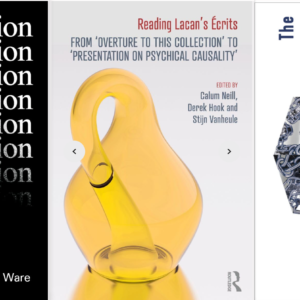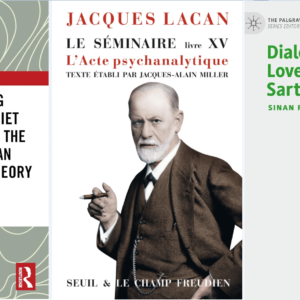News – May 2013
May marked the publication of the official publication of Lacan’s Seminar VI, Desire and its Interpretation, under the editorship of Jacques-Alain Miller. Since Miller’s split from Seuil, the previous publishers of Lacan’s work, in 2011, Seminar VI is the first of Lacan’s seminars to appear under the new publishers, Editions de la Martinière. Although the work is currently only available in French, Miller’s blurb gives an insight into how the latter sees this Seminar (first given in 1958-59) as relevant for the current day and age – specifically, the post-Oedipal age. Here is a translation for English speakers:
What does Lacan show? That desire is not a biological function; that it is not directed to a natural object; that its object is fantasmatic. Thereby, desire is extravagant. It is elusive to anything that wants to master it. It plays tricks on you. But also, if it is not recognised, it produces symptoms. In an analysis, it is a question of interpreting, that is to say, of reading in the symptom the message of desire that it contains.
If desire goes astray, it arouses in exchange the invention of artifices which play the role of a compass. An animal species has its natural compass, which is unique. In the human species, the compasses are multiple: these are signifying montages, speeches. They say what has to be done: how to think, how to enjoy, how to reproduce. However, the fantasy of each remains irreducible to common ideas.
Until recent times, our compasses, as diverse as they are, always pointed to the same north: the Father. We believed that patriarch to be an anthropological invariant. His decline is accelerated with equality of conditions, the increased power of capitalism, the domination of technology. We are in the process of leaving the age of the Father.
Another discourse is the the process of supplanting the old one. Innovation in the place of tradition. Rather than hierarchy, the network. The attraction of the future outweighs the burdens of the past. The feminine overtakes the manly. There where there was an immutable order, transformational fluxes push incessantly at every limit.
Freud is from the age of the father. He did a lot to save it. The Church ended up finally noticing that. Lacan followed the path opened up by Freud, but it drove him to suppose that the Father is a symptom. He shows it here in the example of Hamlet.
What we learned from Lacan – the formalisation of Oedipus, the accent put on the Name of the Father – was his only starting point. Seminar VI already reworks it: Oedipus is not the unique solution to desire, it is only its normalised form; it is a pathogen it does not exhaust the destiny of desire. In fact it is with a praise of perversion that the volume ends. Lacan gives it the the value of a rebellion against the identifications which assure the maintenance of the social routine. This Seminar announced “the realignment of previously instated conformisms, or even their explosion”. That is where we are. Lacan speaks to us.
You can buy the seminar now from Amazon (UK link, French link) and from the ECF’s bookshop. Miller has been promoting the publication through a piece in Le Point, which you can read in three parts through these links (part one, two and three), and on La Regle du Jour.
A somewhat less illustrious publication also made waves in the psy world in May. As heralded in last month’s news update, the publication of the DSM-V was one of the most significant events to take place in the psy field as a whole. The largely skeptical reaction it received from practitioners and in the media demonstrates that opposition to the DSM project is not limited to Lacanians. As mentioned last month, one of the most vocal opponents of the new DSM is the psychiatrist who had headed up the taskforce which put together the DSM-IV, Dr Allen Frances. You can read an excellent summary of his arguments against the new edition in an article he wrote for the New York Post last month here, and add your name to (one of the many) petitions against DSM-V here. Dr Frances will be giving the annual Freud Memorial Lecture hosted by the Freud Museum in London later this month discussing what should be retained and what should be jettisoned in Freud’s legacy, but if you have been unable to get tickets or can’t attend, you can hear a recent interview with Dr Frances on American talk radio is here. On a similar theme, the Museum will also be hosting a roundtable discussion on Freud’s legacy in July. The Museum has confirmed that both this and the Freud Memorial Lecture will be available to listen to as podcasts after the event for those that are unable to attend.
Probably to coincide with the recent widespread backlash against the release of the DSM-V, the BBC is currently running a series entitled The Truth About Mental Health on Radio 4. There are six parts to the series and a limited time to listen to them again via this link, but for posterity they will be added to the LacanOnline Soundcloud page here shortly, so keep checking back.
The Miami Symposium on What Lacan Knew About Women took place in the US in late May, early June. You can review the main programme here, and the breakout session programme here. The organisers have been running various updates through the NLS (New Lacanian School) Messenger over recent months with commentary on themes to be addressed at the event, for example on the issue of gay marriage (mariage pour tous) which has recently exercised the French psychoanalytic community due to its legalisation there last month. On this topic, there is an excellent article on The Quoch, the queer psychoanalysis society, by Chase Dimock reviewing the Lacanian responses and situating them in the context of Lacan’s famous and often mistranslated remark that there is no such thing as a sexual rapport. To coincide with the Miami Symposium a new journal, Culture/Clinic is being published exploring cultural and clinical questions from a Lacanian angle. The first edition of the journal can be purchased here.
The NLS Congress in Athens on the psychotic subject in the era of the geek took place in the middle of May. At the end of the conference, as has become customary, Jacques-Alain Miller took to the stage to announce that the theme of the next Congress, to take place in Ghent, Belgium in 2014, would be ‘The Other without Other’. A transcription of this address has yet to be published but a brief review can be found here on the AMP blog. Keep an eye on the Congress’s blog for more.
Following the controversy around the psychoanalytic interpretations of autism sparked by the release of Sophie Robert’s documentary Le Mur (The Wall) in 2011 (and it’s subsequent banning on the grounds of the inaccuracies in its representation of the analysts interviewed for it), an alternative viewpoint on the topic has been committed to film. D’autres voix, un autre regard sur l’autisme (Other voices, another look at autism) presents a response more sympathetic to psychoanalytical theories on the subject. Although released originally last year, the film is currently enjoying a limited number of showings in France. You can view a recent interview with the director, Ivan Ruiz, here.
Audio of a talk by Suzanne Dow on Lacan with Beckett, first given at the 2010 conference Samuel Beckett – Debts and Legacies, was uploaded to YouTube last month. It is in four parts – here are the links to parts one, two, three and four respectively. Admittedly there are scant references to Beckett in Lacan’s work but Dow explores Lacan’s more general literary references, including the most celebrated one of Joyce.
Finally, clinical psychologist and psychotherapist Dr Jay Watts has put together a great couple of Prezi presentations offering a brief history of psychoanalysis and on how critical psychoanalytic ideas can be employed by critical psychologists. Follow Dr Watts on Twitter here.




Leave a Reply